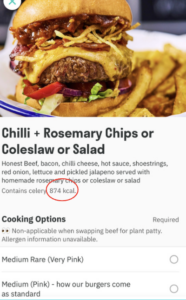features
Let’s face it, forcing restaurants to list calories is a terrible idea
10 Apr 2022
7m
If you’ve been out for dinner this week, you’ll likely have been served something extra alongside your meal. Unfortunately, we’re not talking about a complimentary bread basket, or a dinky ice-cream with dessert – the reality is actually far less appealing.
As of Wednesday 6th April, that pizza you ordered will have come with a big fat label announcing the calories on your plate. It’s because the government has introduced a new law, which means that cafes, restaurants and takeaways with over 250 members of staff have to list the calories in everything on their menus – a so called solution to the country’s ‘obesity crisis’.
But is it? Is a slap on the wrist from the calorie police really going to change the nation’s eating habits, or does labelling calories do little more than shame us?

The last thing we need is to feel guilty over eating a pizza (Credit: Unsplash)
I’m somebody who has always eaten what I want, when I want, and yet I’m the first to admit that the thought of a menu with calories feels like an assault.
So what about those who suffer from disordered eating? The 1.25 million people in the UK for which going out for a meal is already a struggle?
According to research carried out last year, from charity Beat, 93% of respondents thought that calorie labelling would be “negative or very negative” for those with eating disorders.
The charity said they were extremely concerned that the law would not only encourage bad eating patterns more broadly, but also “contribute to harmful eating disorder thoughts and behaviours worsening”.
A matter of days in, it’s clear it’s already doing just that.
An example of calories on menus. Hope the government starts putting more money into mental health services, particularly CAMHS, because the NHS waiting list is long and is only going to get longer. pic.twitter.com/AgSpYV6V2Z
— Josh Barrie (@joshbythesea) April 6, 2022
Discussing her concerns about the new measures, Lily, 20, from Oxford, says: “As someone who has spent going-on-seven years battling an eating disorder, to see calories on anything is stress inducing, as it triggers a compulsion to avoid and to restrict.
“Trying to not define food as simply something that exists as a number of calories – of which the lowest amount possible should be consumed – is something I have been [dealing with] for years.
“To have the government put in place a measure that encourages such behaviours will, no doubt, make it harder to battle that. It allows for disordered behaviour to take place in an environment that should, as much as possible, be discouraging it.”
Lily adds that she believes the new measures will “take [her] back a number of steps” in her eating disorder journey, “because it brings into a reality a fear that [she has] had to fight to overcome”.
“I, along with many other people with eating disorders, have had to deal with intense fear of eating something that someone else has cooked, due to the lack of control over what is put into it and how many calories something might be,” she explains.
“I spent years dreading and avoiding family meals, takeaways, visits to restaurants etc due to genuine fear of the food involved because I couldn’t control what was going into it.
“The effects that these measures will have on mine, and so many other people’s mental health, entirely outweigh the supposed benefits of them, before we even bring into question how problematic those perceived benefits are.”

Calories will also be listed on takeaways with 250 employees or more (Credit: Deliveroo)
Lily isn’t alone in her concerns, either. Emma, 24, from Liverpool, shares similar anxieties about the new measures.
“I had anorexia from the age of 14 but I’ve maintained a stable weight and a good relationship with food for about four years now,” she says. “When I was in the early stages of recovery, seeing calories on a menu would have made it impossible for me to eat out.
“Calories on food packaging was hard enough, but my parents could hide that away and make sure that I wasn’t in charge of choosing food or preparing it. Seeing calories on a menu would have ended in a meltdown and eating out was hard enough already.
“A meal out or a takeaway is a treat, a one off, a celebration. Whether you’re overweight, underweight or whatever, calories shouldn’t be part of choosing a nice meal when you’re out celebrating.
“One meal does not impact your weight and it’s toxic to suggest that it does”.
Of course, this isn’t to say we shouldn’t be tackling obesity. It’s thought that overweight and obesity-related health concerns cost the NHS as much as £6.1 billion year on year, and two-thirds (63 per cent) of adults in England are classed as overweight or obese (although, this is using the BMI, a scale which was developed all the way back in the 1830s).
The problem is that this week’s actions are based on little to no evidence, and experts believe they are unlikely to yield success.

The new law is meant to tackle obesity (Credit: Alamy)
For one, you just have to look at stats from the US to see that forcing calories on people is far from a long-term solution. New York restaurant menus begun featuring calories back in 2008, and whilst there was a short-term change in what was ordered, “the percentage of respondents noticing and using the information eventually declined,” prompting no lasting difference in behaviour.
Plus, Stuart Flint, the director of Obesity UK, recently told The Observer that he was unclear who exactly the new laws would help.
“The reality is that we’ve had 14 policies over the last 20 years related to obesity, and it hasn’t decreased, it’s increased,” he said. “And the reason is that most of those are focused on individual changing [rather than education, and de-stigmatisation of obesity]”.
“We are extremely disappointed that the Government is making calories on menus mandatory in England from 6th April, despite evidence that it causes anxiety and distress for people affected by eating disorders,” Tom Quinn, Beat’s Director of External Affairs, tells Twisted.
“We know from the people we support that including calories on menus can contribute to harmful eating disorder thoughts and behaviours worsening, for instance it can increase a fixation on restricting calories for those with anorexia or bulimia, or increase feelings of guilt for those with binge eating disorder.
“Sadly we know that the pandemic has contributed to more people than ever before needing support for these serious mental illnesses.
“There is also very limited evidence that the legislation will lead to changed eating habits among the general population.
“Beat has continually asked the Government to consider the impact on people affected by eating disorders. This should involve consulting eating disorder clinicians and experts by experience at every stage of the process.”
Concern and scepticism about the idea of calorie labelling is so prevalent amongst eating disorder charities that several brands have taken matters into their own hands, with Wagamama suggesting customers can ask for a calorie free menu if they so wish, and The Ivy placing their calorie information behind a QR code, rather than on their normal menus.
But that’s not to say there isn’t support from the public. In fact, research shows that 80% of us are in favour of the government’s decision to put calories on menus. The question is, why?
According to Naturopathic Nutritionist and Personal Trainer, Danny Ly, this is all down to a misunderstanding about what calories actually are, and what counting them ultimately achieves.
“Labelling food items with just their calorie content without the education around what to do with this information and how to actually create a balanced and sustainable healthy lifestyle is pointless,” he explains.
“Calories don’t tell you how much fibre, vitamins, minerals and nutrients that a single meal contains.
“We also don’t absorb all of the calories we eat. For example, if you were to take a pack of unroasted almonds, they would say 100g contain 579 calories. Studies have shown that we actually absorb 25% less of these calories because of the amount of fibre they contain.
“Solely focusing on the amount of calories in a meal won’t [inform] us on the importance of good nutrition and a wholesome, balanced [plate of food].”
Calories on menus this week guys. The law kicks in for “large hospitality businesses” to display calorie info on menus. What a terrible, terrible thing to happen to the hospitality industry and a waste of time, money and a potential danger:
a thread…— Sven-Hanson Britt (@Svenhansonbritt) March 28, 2022
Chef Sven-Hanson Britt, of London’s Oxeye restaurant, agrees.
“The crux of this issue is that our relationship with food is really, really bad in this country, for a whole number of reasons,” he says.
“The way to solve that is through generational change over a long time, not just slapping calories on a menu, because that’s just going to lead to more problems and solutions.”
Pledging not to take part, should the law stretch to smaller restaurants in the future, he adds: “I’d rather take a fine. This whole issue stems from our relationship with food… how we interact with it, how we eat, what we’re taught from a young age about what real food is, and where it actually comes from.
“[Calorie counting means] people just eat by numbers, without learning about a balanced diet, or nutrition… we should be putting money towards giving people the knowledge they need to work out their own diet.
“From a chef’s perspective, it’s really easy to list calories. There’s all the tech and then also consultancy companies that can charge you an arm and a leg, but if you look at it from a humanist point of view, I just think it’s a potential disaster for our relationship with food.”



.jpg_dU0O4c?tr=w-2560,f-webp,q-70)